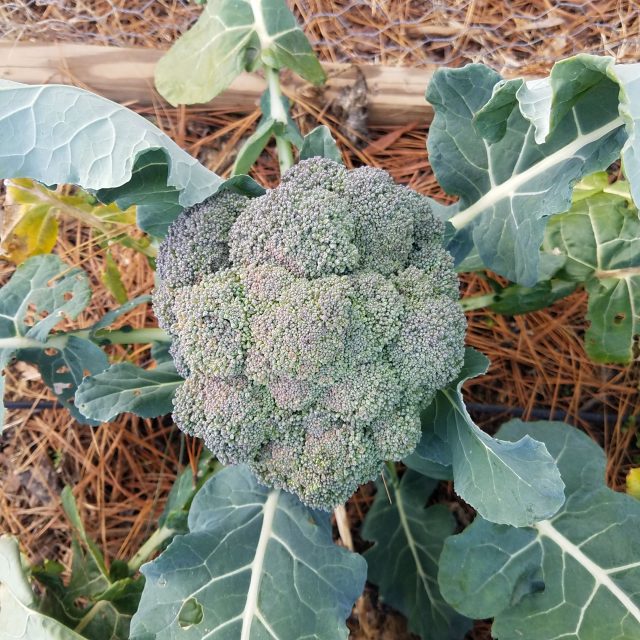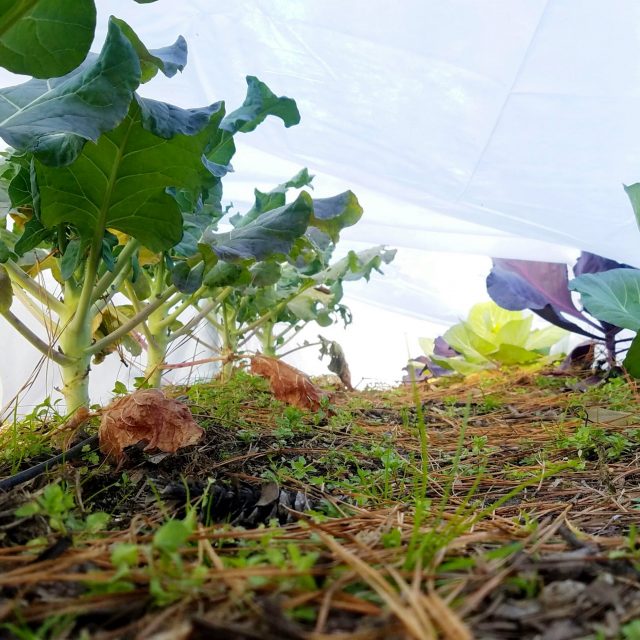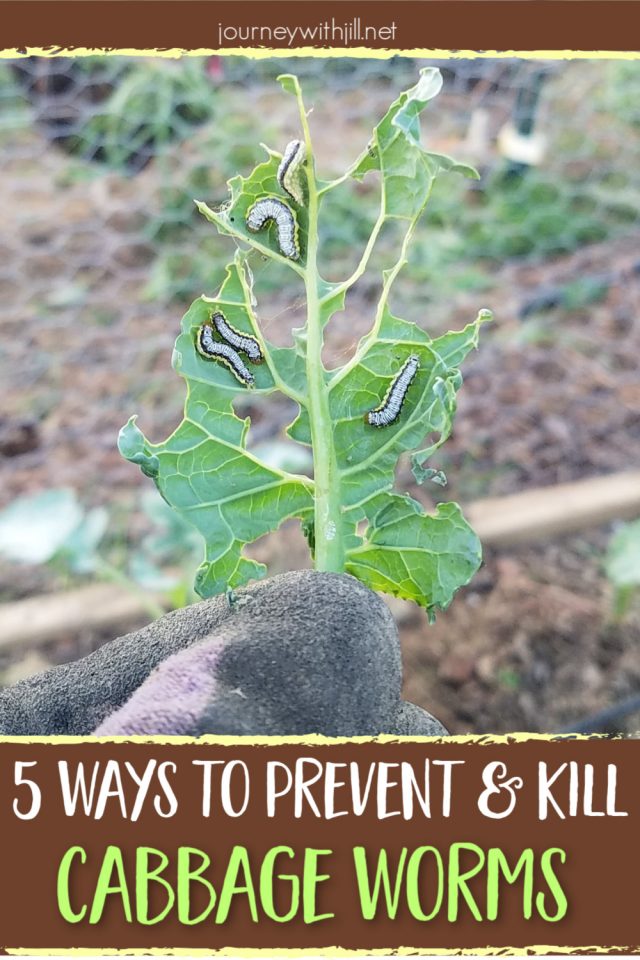5 Organic Cabbage Worm Pest Control Methods
What gets rid of the cabbage worm? How can you prevent these small but mighty worms that prey on your garden?
If you’ve ever noticed the eaten leaves of your broccoli, cabbage, or kale, you’ve likely encountered one of worms that attacks the brassica family of plants. Even organic gardeners struggle to find ways to control these pests that can decimate your beloved cole crops in short order.
In this episode of the Beginner’s Garden Podcast and in the article below, you’ll learn 5 organic ways to both prevent and get rid of cabbage worms in your garden. Click below to listen or continue reading.
*links below contain affiliate links
How to Identify Cabbage Worm Damage
Cabbage worm damage is usually fairly easy to identify. You’ll probably first notice holes on your cabbage or broccoli leaves or the leaves may look skeletonized. Sometimes the worms will eat the bottom layers of the leaf and leave a thin top layer that almost looks like stained glass.
In addition to leaf damage, you may notice dark green frass (their droppings). If the worms are small and mostly inconspicuous, this frass may be your first clue to an infestation.
Some varieties of cabbage worm will also attack the heads of your cabbage, broccoli or cauliflower.
In addition to cabbage, broccoli, and cauliflower, cabbage worms will also dine on your kale, Brussels sprouts, kohlrabi, collard greens, turnip greens, leafy greens, and even radishes.

Best Ways to Prevent Cabbage Worms
Create a barrier, such as a floating row cover. Cabbage worm eggs are laid on your plants by a moth. If your plants are covered by this floating row cover, they cannot lay their eggs on them. These row covers still let in light and water. This is one of the top recommended, most effective ways to prevent cabbage worms.

How to Kill Cabbage Worms: Handpick
If you know you already have a cabbage worm problem, try handpicking the worms you see and crush their eggs. This is the least invasive method, but it is the most labor and time intense.
Pick them every day, especially when they are most active during the late spring and early fall. Also look for the yellow eggs that are attached underneath the leaves.
Organic Pesticide Options for Cabbage Worms
Although I recommend less invasive methods to control any garden pest — as even organic insecticides aren’t without their drawbacks for beneficial insects, in some cases these options may be required to save your plants.
Bacterial Thuringiensis var. Kurstaki
My top recommended organic pesticide to kill cabbage worms is bacterial thuringiensis, also known as BT. This is most effective when sprayed on young worms. You spray the leaves, the worm eats the leaf and eventually dies. Re-apply weekly and after every rain.
You can also apply BT as a powder that you dust on the leaves. Again, reapplication will be required.
One thing to keep in mind is that BT breaks down quickly in the environment, so if you choose the spray, make up a new batch with each application. Follow the instructions on the bottle carefully.
Spinosad
Spinosad is another pesticide you could use but it is more harmful to your beneficial insects. You will want to be very careful if you choose to use Spinosad because it could have an unintended impact on your garden, and for this reason I recommend you start with BT first and save spinosad for a last resort.
Cornmeal or Rye Flour
One technique that sounds like an old wives’ tale is to rub cornmeal or rye flour on the leaves. You will also have to re-apply frequently as rain will wash this away.
Companion Planting to Deter Cabbage Worms
For a more thorough discussion on companion planting for pest control, read more about that here.
Another idea is to use a method called trap-cropping. I haven’t tested this in my garden, but I’ve read that planting mustard can cause the cabbage worms to gather on the mustard plants instead of your brassicas. (You essentially use mustard to “trap” the cabbage worms on it instead.)
You could also try planting red leaf cabbages or tighter heads of cabbages because the worms seem to not prefer these varieties.
Cabbage Worm Predators
Create a hospitable environment and try to attract the cabbage worm’s natural predators. Paper wasps and yellow jacket wasps supposedly enjoy dining on cabbage worms. To attract these wasps, you could build bottomless bird houses and hang them as nesting places.
The tachinid fly also seems to like to eat cabbage worms as well as many other garden pests. Tachinid flies are attracted to cilantro, dill, parsley, coriander, buckwheat, sweet clover, aster, chamomile, and shasta daisy. While I like to have my herbs close to the kitchen, I’m beginning to include some of these herbs and flowers in my beds to attract tachinid flies.
Chickens also like to eat cabbage worms. The only problem is while they like to eat the worms, they will also eat the crops that the worms are on. Other birds will also eat cabbage worms so you can attract them by having a bird bath or some sort of perching site close to the garden.
Conclusion
Cabbage worms may always be a nemesis in your garden, but by putting these organic prevention and control methods in place, you should have much more success and harvest healthy brassicas from your garden.

More Resources:
Practice Organic Cabbage Worm Control for a Chemical-Free Garden
Cabbage Worm Control
How to Identify and Get Rid of Cabbage Worms
The Tachinid Fly: A Parasitic Fly with Pest Control Potential
Avoid Common Beginning Gardening Mistakes

Grab this free download and not only discover some of the most common mistakes first-time gardeners make -- but even more important -- learn what to do to avoid those mistakes altogether!
Plus, I'll send you my "In the Garden E-mail" on Fridays, periodic updates on garden resources relevant to you, and get access to my entire bank of free garden downloads!
You are also agreeing to our privacy policy.



A bigger cabbage problem for me is the cabbage root worm .
Damages radishes, turnips and turnips. Suggestion for control?
Thank you
I’ve personally never dealt with them, but this article gives some ideas you might try: https://www.almanac.com/pest/cabbage-root-maggots
Thank you ?, this helps me a lot in The ??.